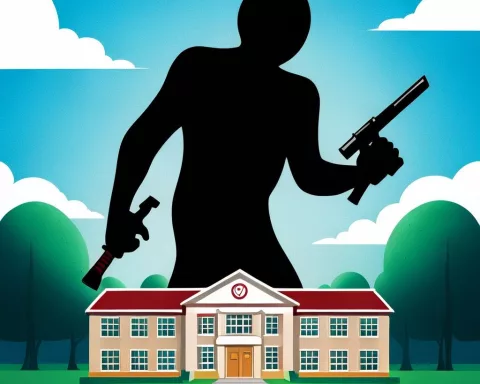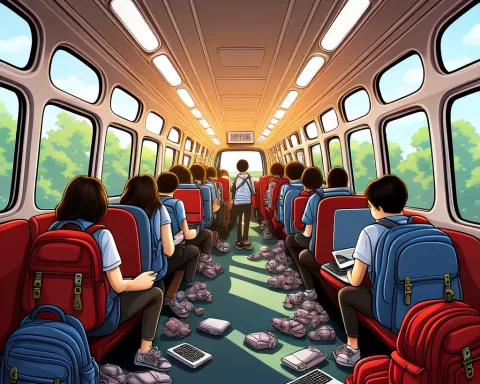Students at a Cape Town high school were involved in a disturbing mock auction that resembled scenes from slavery. The incident, filmed and circulated on social media, triggered investigations by school officials and widespread indignation. A spokesperson for the Western Cape Education Department confirmed that the students’ actions were not in line with the values and principles of the department or the school. The incident highlights the need for ongoing dialogues about racial equality, mutual respect, and education on the lasting effects of historical crimes such as slavery.
What happened in the Cape Town high school incident?
Students at a local high school in Cape Town engaged in a mock auction that resembled scenes from the era of slavery. Black students were confined in a makeshift cage while other students solicited bids as if auctioning off their peers. The incident triggered widespread indignation and investigations by school officials.
The tranquility of Cape Town was recently disrupted by a deeply unsettling incident at a local high school. Students partook in a mock auction that shockingly mirrored horrific scenes from the era of slavery. This disturbing event, captured on camera, rapidly made its rounds on various social media platforms, triggering widespread indignation and leaving the community wrestling with its painful implications.
Unsettling Scene Emerges
The video, though not suitable for public viewing due to the involvement of minors, paints a distressing scene. It features Black students, garbed in different versions of the Pinelands High School uniform, confined in a space resembling a storage area typically used for bicycles and umbrellas. On the outside of this makeshift cage, other students were caught on camera, seemingly soliciting bids as though auctioning off their peers.
The ‘auctioneer’ requested silence before kick-starting the bidding process at R100,000. In a spine-chilling imitation of the brutalities of slavery, bids rapidly shot up to an astounding R200 million. The footage concludes on a profoundly disturbing note with a Black student standing inside the cage, appearing to smile as the auctioneer announces, ‘Sold!’
This footage stirs up disturbing memories of the era between 1658 and 1807, a period during which an estimated 63,000 people were wrenched from their homes and sold into slavery.
A Parent Speaks Out
One mother, who chose to remain anonymous to protect her child’s identity, confirmed her grade 8 son’s narrow escape from being ‘auctioned.’ She recounted that a group of male students had attempted to force her son into the cage. However, he resisted and was subsequently let go. The mother emphasized that the Black students were not willful participants in this distressing event; they were coerced into it.
Dishearteningly, this was not her son’s first encounter with racism. He had previously been subjected to derogatory remarks, reduced to offensive terms like ‘go and eat chicken feet’, and told that his ‘upgrade’ would be boys who had assimilated. The cumulative effect of continuous bullying has led to his developing a deep reluctance towards school.
The incident served as a harsh wake-up call to the relentless battle against racism, even three decades into democracy. The disheartened parent lamented, “My 14-year-old is experiencing this? It’s deplorable.”
Official Response and Steps Forward
Bronagh Hammond, spokesperson for the Western Cape Education Department (WCED), confirmed the department’s awareness of the incident. She stated that the students’ actions were not in line with the values and principles of WCED or the school. She disclosed that senior officials had visited the school in response to the incident.
In light of the allegations of racist bullying, the school administration has initiated an investigation. The students implicated in the incident are being interviewed and provided with support, including counselling. The parents of these students, along with the wider parent community, are also being contacted for further discussions.
Enduring Racism and the Need for Education
Events like these force society to face the brutal truth of persistent racism. It emphasizes the importance of ongoing dialogues about racial equality, mutual respect, and tolerance, particularly within educational settings. This incident underlines the critical need to educate youth about the terrifying and lasting effects of historical crimes such as slavery, in order to prevent the trivialization of such significant issues.
What values and principles were violated by the Cape Town high school incident?
The students’ actions during the mock auction were not in line with the values and principles of the Western Cape Education Department or the school. The incident violated the principles of racial equality, mutual respect, and education on historical crimes such as slavery.
What steps are being taken in response to the incident?
The school administration has initiated an investigation into the incident. The students involved are being interviewed and provided with support, including counseling. The parents of these students, along with the wider parent community, are also being contacted for further discussions.
How does the incident highlight the need for ongoing dialogues about racial equality?
The incident highlights the importance of ongoing discussions about racial equality, mutual respect, and tolerance, particularly within educational settings. It underlines the critical need to educate youth about the lasting effects of historical crimes such as slavery, in order to prevent the trivialization of such significant issues.
What are some of the lasting effects of historical crimes such as slavery?
Historical crimes such as slavery have had long-lasting effects on individuals and societies. These effects include intergenerational trauma, economic disadvantage, systemic racism, and a legacy of inequality. It is important to educate youth about these effects to prevent the trivialization and perpetuation of racial discrimination and prejudice.
What impact has the incident had on the community?
The incident has triggered investigations by school officials, widespread indignation, and ongoing discussions about the need for education on racial equality. It has also had a profound impact on the Black students involved and their families, highlighting the enduring effects of racism and discrimination in society.
How can we work towards preventing incidents like this from happening in the future?
Preventing incidents like this requires ongoing education, dialogue, and action towards eradicating racism and discrimination in all forms. Schools and educational institutions can play a vital role in this by promoting diversity, inclusion, and tolerance through curricula, policies, and programs. It is also essential to hold individuals and institutions accountable for racist behavior and to provide support and resources for those impacted by racism and discrimination.












